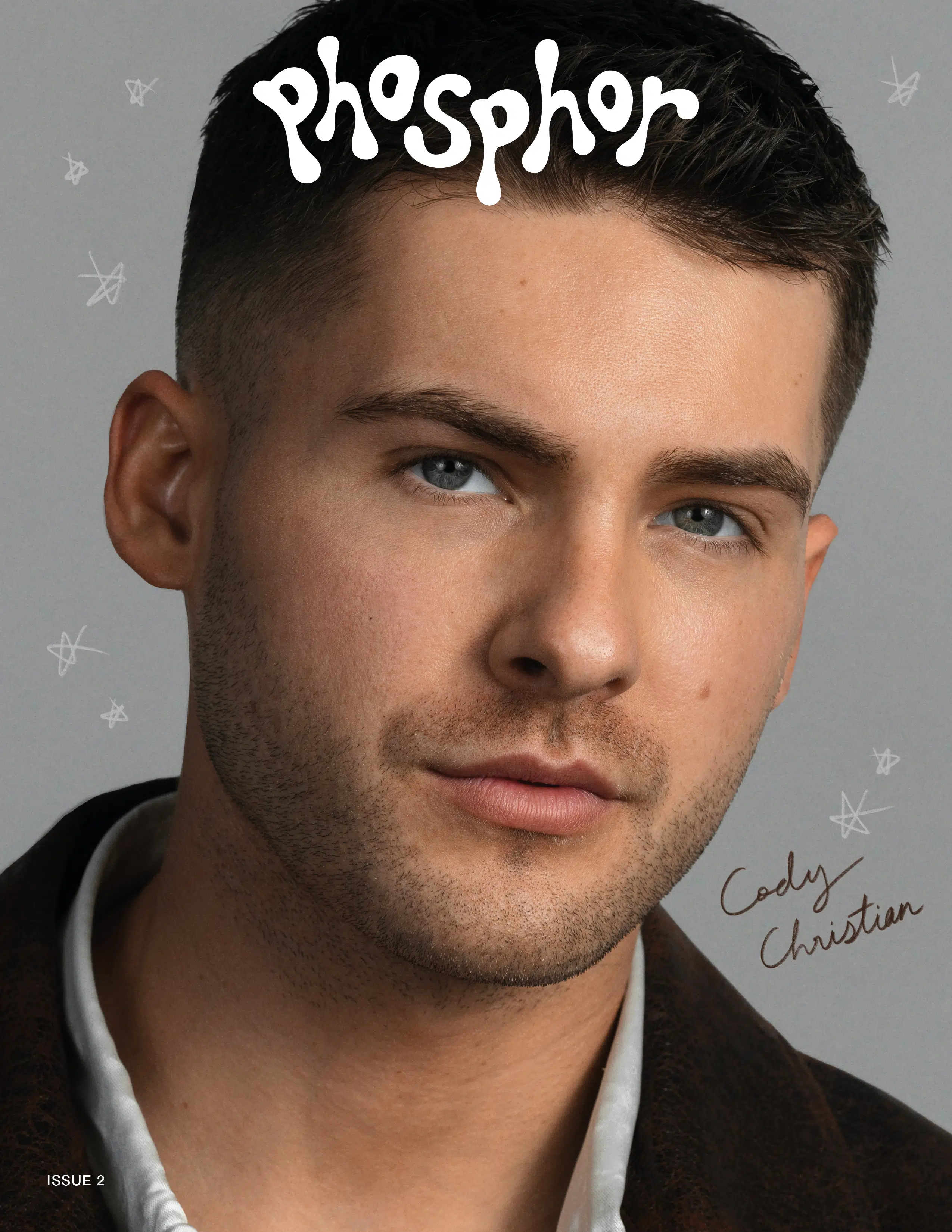
Cody Christian on the impact of storytelling
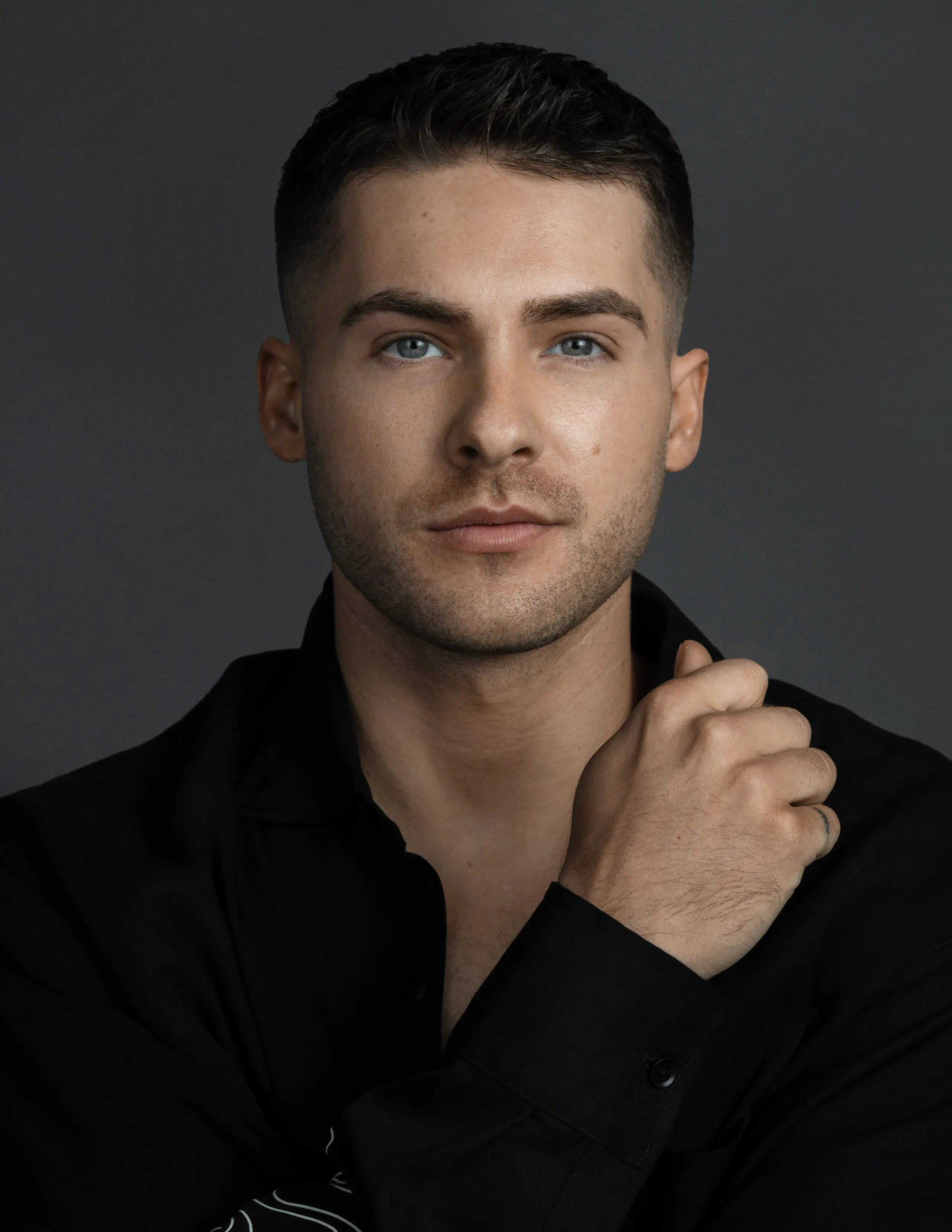
Top and jacket PERSONAL/OWN, pants STRIKE OIL, shoes VANS.
As he touches upon the evolution of acting as a timeless method of expression, Cody Christian reflects on the widespread cultural influence he’s witnessed through projects like Teen Wolf and All American. After traversing the entertainment industry for most of his life, Christian also discusses his future aspirations as an actor and the avenues of creation he hopes to pursue next.
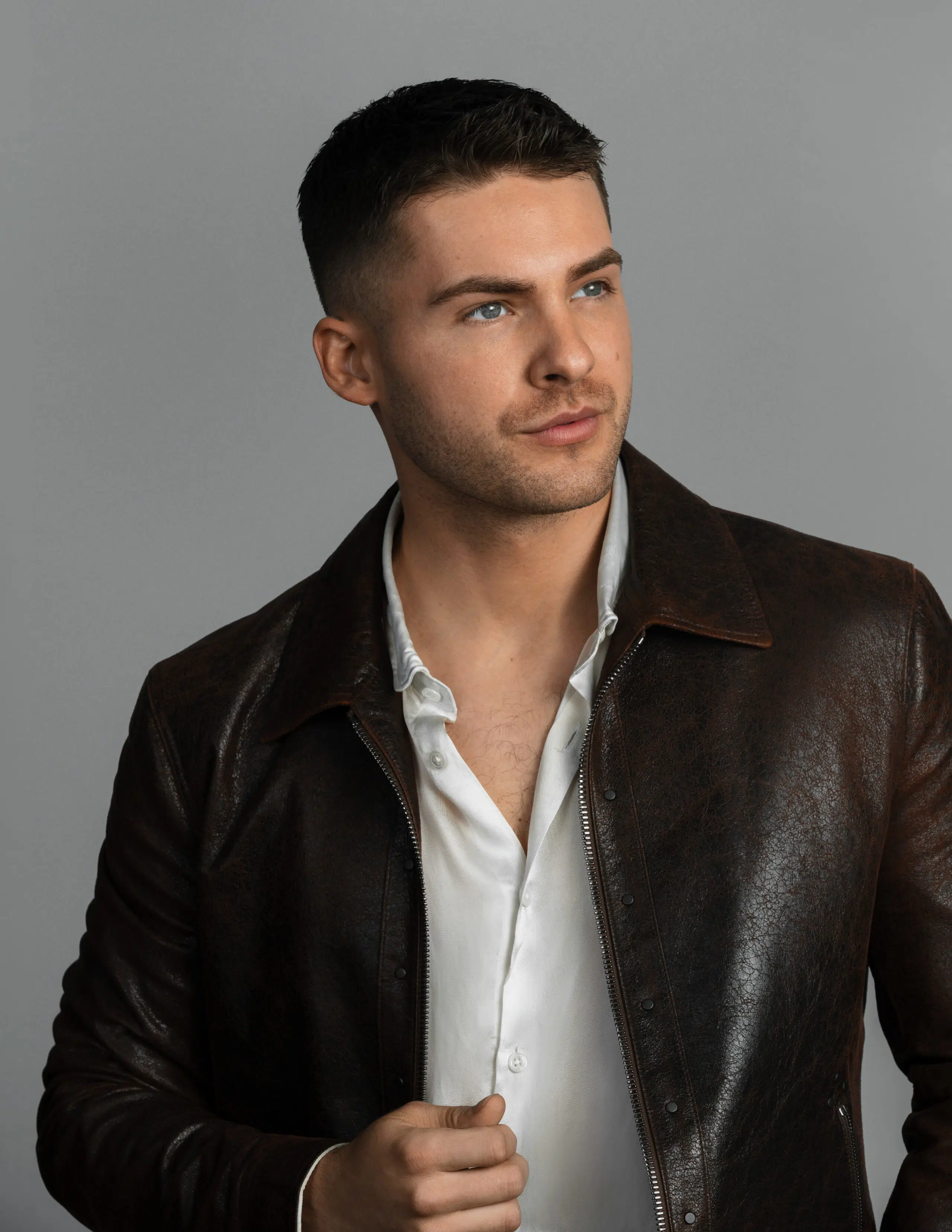
Top and jacket JOHN VARVATOS, pants LEVI’S.
Cody Christian is no stranger to the multiverse of teen dramas. His roles on iconic television series like Teen Wolf and Pretty Little Liars have afforded him the opportunity to try everything — from fleshing out definitive redemption arcs to discordant sibling relationships. Most recently, as Asher Adams on All American, Christian has taken on the temperamental attitude and one-track mind of an aspiring athlete attempting to make it to the big leagues.
A self-described “creative soul,” he also understands the significance of being involved in shows that can be identified by an entire generation. Christian revels in the opportunity to make an impact significantly bigger than himself. He’s learned to remove his own interests from the equation and let the art simply speak for itself, in ways he once never understood were possible. “Art in general, regardless of the format, has the ability to really affect people in a subjective way and change them for the best.”
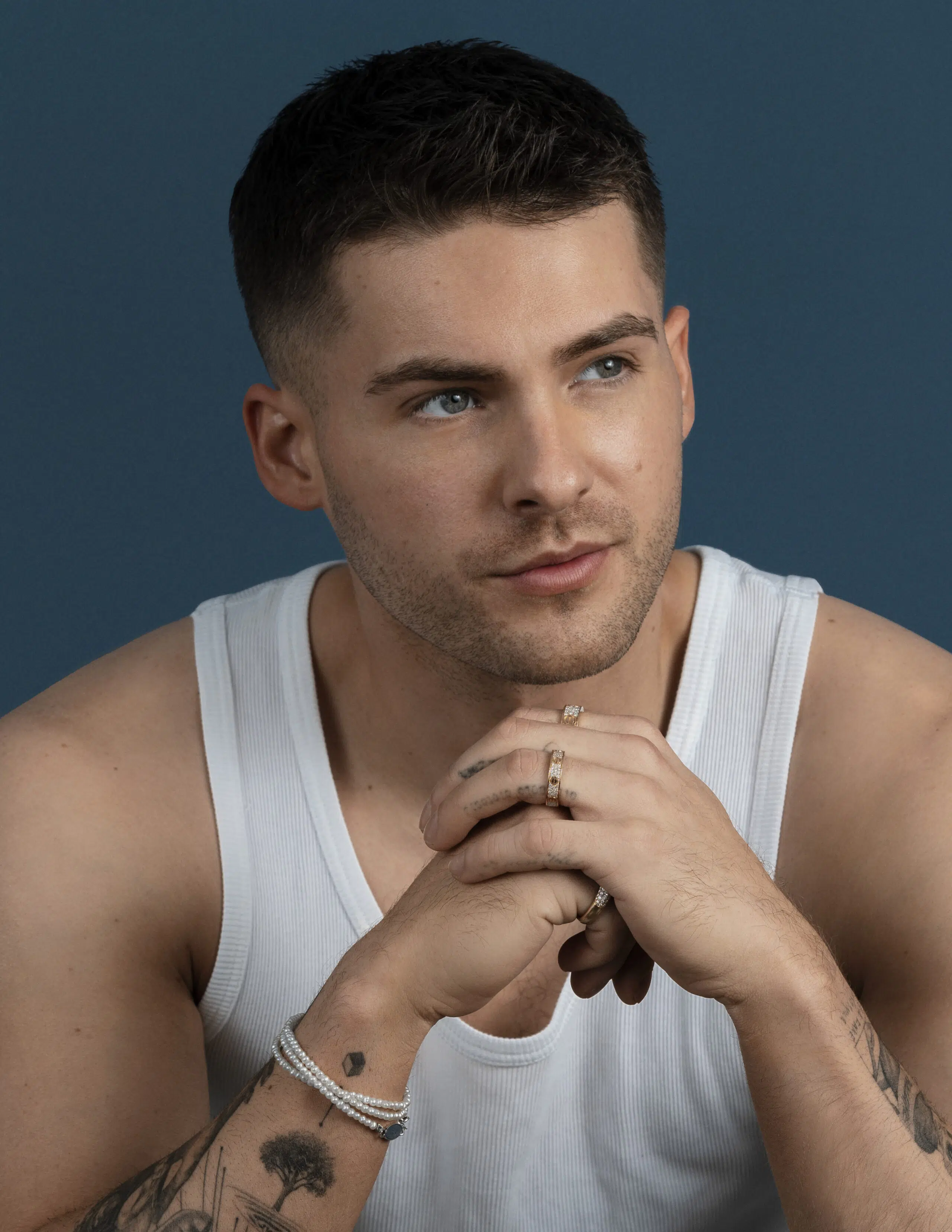
While Christian can recall two pivotal moments of clarity that pointed him towards acting, he explains that he more or less “stumbled into it.” Until the age of eight, Christian grew up in midwestern Indiana and spent his childhood thousands of miles away from Los Angeles. And like any kid, he dreamed of a million different lives — none of which involved being an actor. “Before the age of 10, there were probably four or five, maybe six different things that I potentially wanted to pursue. By happenstance, I heard a radio commercial for this acting school. I never really thought about that as a possibility beforehand. I ended up going to this acting school. Long, long story short, it was a giant scam, but it immersed me in this world that I didn’t realize.”
Before tuning into that predestined radio commercial, Christian’s aspirations were largely more traditional. He initially had his sights set on attending a good college to play football or baseball while getting a degree. His family also had a heavy military background, so Christian briefly considered becoming a Navy SEAL or even a surgeon — inspired by a touching documentary about doctors volunteering to assist with cleft lip reconstruction surgery. “When I was around nine years old, I remember vividly thinking that acting and the art of storytelling would allow me the opportunity and foundation to live all of these different slices of life very authentically, and that became very intriguing.”
Christian ended up moving out to California shortly after to connect with agencies and began studying acting at a higher caliber. He soon found himself taking an acting class under the guidance of the late Richard Brander, who became his mentor and coach. Brander was the definition of old school, having lived in New York during the golden age of theater in the 50s and 60s. He was the first person who showed a young Christian what acting was, proclaiming that it was “the fine art of being alive.”
“That sort of philosophy with the craft, it helped me immensely as a child in navigating this world. Without him even realizing it, he taught me a way of life that was cemented around being incredibly present and what that can actually bring into your life when your mind, your heart, and your consciousness are all in one place. That’s the anchor of playing make-believe, too. You have to go in and adopt these circumstances that you and I and this camera know aren’t real. But in order to achieve some sort of suspense of disbelief, we anchor ourselves in that present moment so powerfully that whatever is occurring is real to us.”
For Christian, Brander’s outlook was life-changing. It was the “light bulb moment” that allowed everything to fall into place and solidified Christian’s commitment to acting so early into his life. “[Acting] came into my life when I really needed something to anchor me, and it saved my life multiple times. Since then, I decided that I want to do this and be in pursuit of this for the rest of my life.”
Christian remembers an instant attachment to Hollywood figureheads like Leonardo DiCaprio. He was also fascinated by mid-century marvels like Marlon Brando and Laurence Olivier who once dominated the box office — accredited to Brander’s more old-fashioned teachings. “He put me on to a lot of the foundational stuff from a lot of actors early on in the industry to study the evolution of what it was and where it is now,” Christian says. “Real actors at that time were delivering powerhouse performances on a screen in a way that no one had seen before, and it was mesmerizing.”
Learning from these luminaries showed Christian just how influential and eternal the practice of storytelling could be. “I’m super grateful for being exposed and immersed to the real, raw sort of storytelling — at least the type of storytelling I like to do.”
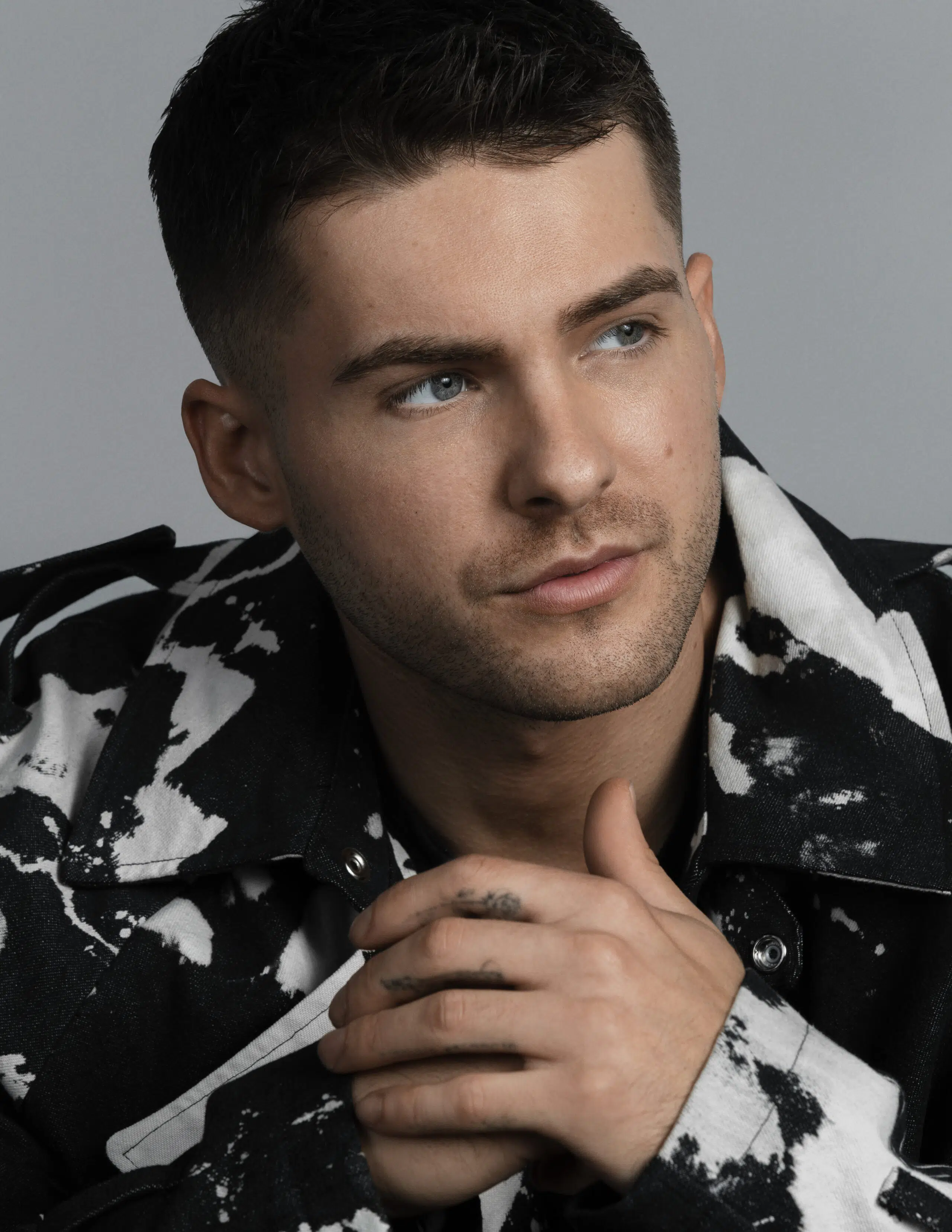
Coat STRIKE OIL, pants LEVI’S, shoes VANS.
Since 2018, Christian has played Asher Adams on All American, whom he describes as “a kid playing pretend.” Asher has a troubled past and is hopelessly lost, constantly struggling to find a sense of identity beyond football. Without the status or money to make it in Beverly Hills, Asher’s life feels like an illusion — something that can be shattered as easily as it was created. The sport becomes his only way out, his life or death. In the earlier seasons, Asher would do anything to accomplish his goal of playing professionally, even if it meant sacrificing his own morals and ethics.
“For me, it was very important in the beginning of All American — and specifically, with Asher — to understand what that meant, to really put myself in the mind of an athlete,” Christian says. “I have a lot of friends who are professional athletes now. At the time, they were the first people that I went to and sought advice from. For me to tell Asher’s story properly, I had to understand what it actually felt like to not really see the world outside of a football helmet.”
Christian has come to terms with the kind of intense mentality athletes are trained to have, one that transcends the field or the court. He sympathizes with their challenges and understands the stakes that extend to every aspect of their lives. “It’s a lot of pressure, and some people can’t understand or grasp why they look or think or act the way that they do. But to a lot of these kids, this is everything to them. They put their heart and soul on the line every single day. Especially with Asher, his journey was specific because for a majority of his life, he believed it was going to head in one direction. Then we fast forward to the end of season three, [and] his life has completely turned upside down. It was fun to establish where he was and what the stakes were.”
Aside from adopting that “all-or-nothing” mindset, Christian physically built himself like an athlete to prepare for the role. “[It was] a lot of being out on a field and thinking like an athlete, moving like an athlete, training like an athlete, and eating and sleeping like an athlete. It really took over everything in my life.” He even purchased his own football throwing machine, a decision he confesses was “so expensive and so unnecessary” in hindsight. But at the time, Christian was dedicated to going the whole nine yards for All American. “I bought a JUGS machine that would shoot footballs at you up to a hundred miles an hour. I got in the habit of going out there every day and putting gloves on and going through all of my routines and my catches. It was something that connected me to the character at the time.”
Like any other character on the show, Asher is evidently flawed and far from perfect. It’s this reality, albeit admittedly frustrating at times, that Christian appreciates. He’s been able to tackle new storylines time and time again, using his character as a vehicle for change. “My favorite part of his whole journey was how real we kept it. A lot of the time, I was the one doing the bad stuff,” Christian says. “But when you zoom out, it was so integral to Asher’s growth. Time and time again, you’re almost face palming like, ‘yo, come on, man, haven’t you learned your lesson?’ Looking at where he started and where he’s at now, he’s been a human and everything that that means.”
Put simply, Asher’s been through a lot throughout All American — a heart condition that benches him from the sport he loves, the loss of a father figure-like coach, and the end of what was once a mutually healthy, healing relationship. He’s just entered yet another phase of life, becoming a young dad to a baby boy named AJ. “It comes with a lot of stress and anxiety and baggage, but we see him and his partner maneuver through it. It feels like I’ve been granted the opportunity to play so many different characters in one, to have a show and a character arc that stretches over six and a half years,” he says.
While Christian relates to the gratitude and patience Asher has accumulated through a painstakingly long process of character development and maturity, he hopes that audiences interpret his presence on-screen separately from his own persona.
“I really relish in the opportunity to let go of everything that I am — who I am as a person, the way I think, and the way I feel. A lot of actors have different opinions about this, but where I stand is that if I’m inhabiting a character and telling a story that’s occurred in their life, it isn’t always necessary to inject how Cody thinks and feels. Sometimes, I perceive it as a little selfish to want to put myself in there. For a lot of the stories that I like to tell, and especially moving forward in my career [with] the roles that I want to choose, I hope that I’m not reflected in them at all. Actually, I hope that there’s not too much that I can identify with, because to me, that is the fun part.”
All American also features complex social issues, such as mental health, substance abuse, and racial discrimination, that are directly tethered to real world discourse. To Christian, incorporating these recurring topics within the fictional premises of the show helps viewers comprehend and synthesize current events. It’s an approach that breaks down established defenses and one he considers more digestible. “People want to see a reflection of the real world in which they live. If you go back to the origins of storytelling and the performative art of theater in ancient Greece, choruses of people would cite songs and poetry and hymns. There was an opportunity for them to almost break the third wall and take it from directing it towards you, to now directing it towards another character on stage with them. It allows the audience to view, perceive, feel, and come along with the journey and not be so right in your face. I think it’s always refreshing. It’s important to see a slice of that reflected in the storytelling we consume.”
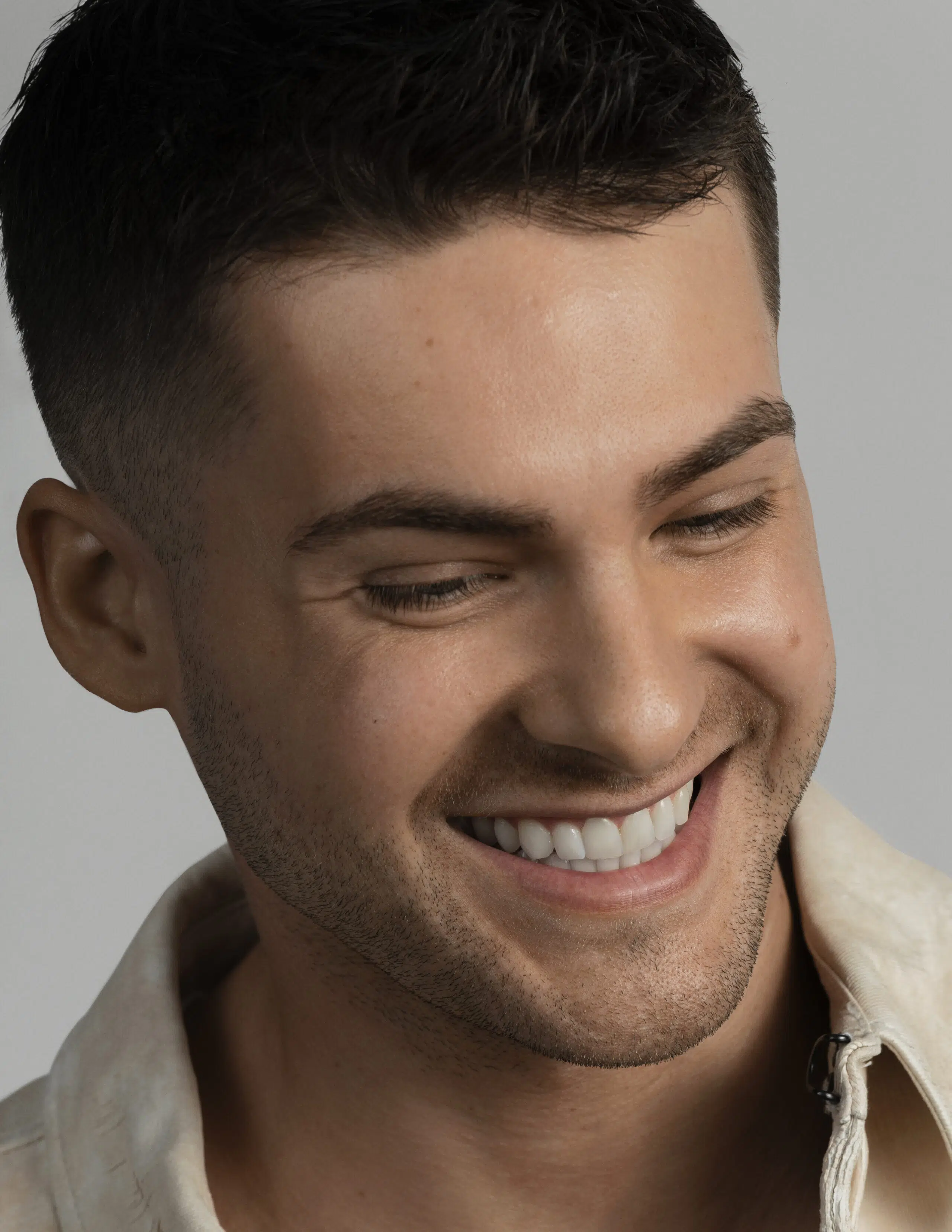
Jacket JOHN VARVATOS.
Years before All American, cult-classic projects from major networks like ABC and MTV put Christian on the map. After primarily working on smaller movies and non-union productions, Pretty Little Liars was the first role that quite literally affirmed Christian was “moving in the right direction.” He recalls stepping onto the Warner Brothers lot for the first time and thinking to himself, “wow, this is real.”
“I was born on the East Coast and grew up in the Midwest. I didn’t really know anything about this industry. I didn’t have anyone out here connected to this. It was all learning from the jump. For Pretty Little Liars to be the project that put me on a very iconic, historic studio lot — that meant everything to me.”
In 2015, after Pretty Little Liars, Christian landed the role of Theo Raeken on Teen Wolf. Theo was originally conceived as a supporting character who would only appear in a handful of episodes, but he was eventually upped to an integral antagonist by season five. Engineered to be the perfect weapon, Theo was manipulated into turning Scott’s (Tyler Posey) pack against each other. He eventually rises above his roots as a villain, winning back their displaced trust to prove that there’s still good in him. “Teen Wolf was the first time that I felt I was able to give a performance that connected with people in a universal type of way. I look back, and I have the fondest memories of bringing Theo’s character to life. Selfishly, it was so much fun.”
A few years after production on Teen Wolf had wrapped, Christian found himself attending a fan convention in Paris. He went in expecting the usual — meet and greets, photo ops, and autographs. But there was one interaction he’ll never forget, “a very real and very raw” exchange with a young fan that contrasted the typical animated, giddy energy he was familiar with.
“She told me how much of an impact [Theo’s] character and who he was had on her life. She shared with me that she had been in a place where she wasn’t quite confident that she would make it to the end of each day, and how much all of this — this story, this character, and me as the actor bringing it to life — really meant to her,” Christian says. “After she shared all of this, she lifted up her sleeve. She had cut marks from her wrist all the way up past her elbow and the back and the front multiple times.”
“It hit me so heavily because of what I shared when I had that experience. It was so fun. It was so selfish — I was there, I was present, and I was having a blast with Sprayberry and Posey and O’Brien and living parts of my dream and my fantasy. I wasn’t really even thinking about the reach that it could potentially have. When I met that girl, that shit rocked me to my core. It really changed my whole perspective on how powerful this could be. I’m grateful that it happened at that time in my life — I think I was 21, 22, 23, maybe somewhere around there. It showed me how powerful of an impact this could all have.”
For Christian, that individual encounter would forever be enlightening. It now serves as a potent reminder of the influence he can have as an actor and the permanent impression he can leave on others through his work. “I still think about it to this day. I carry it with me to every project, every performance, every time I step out anywhere. This can be bigger than me.”
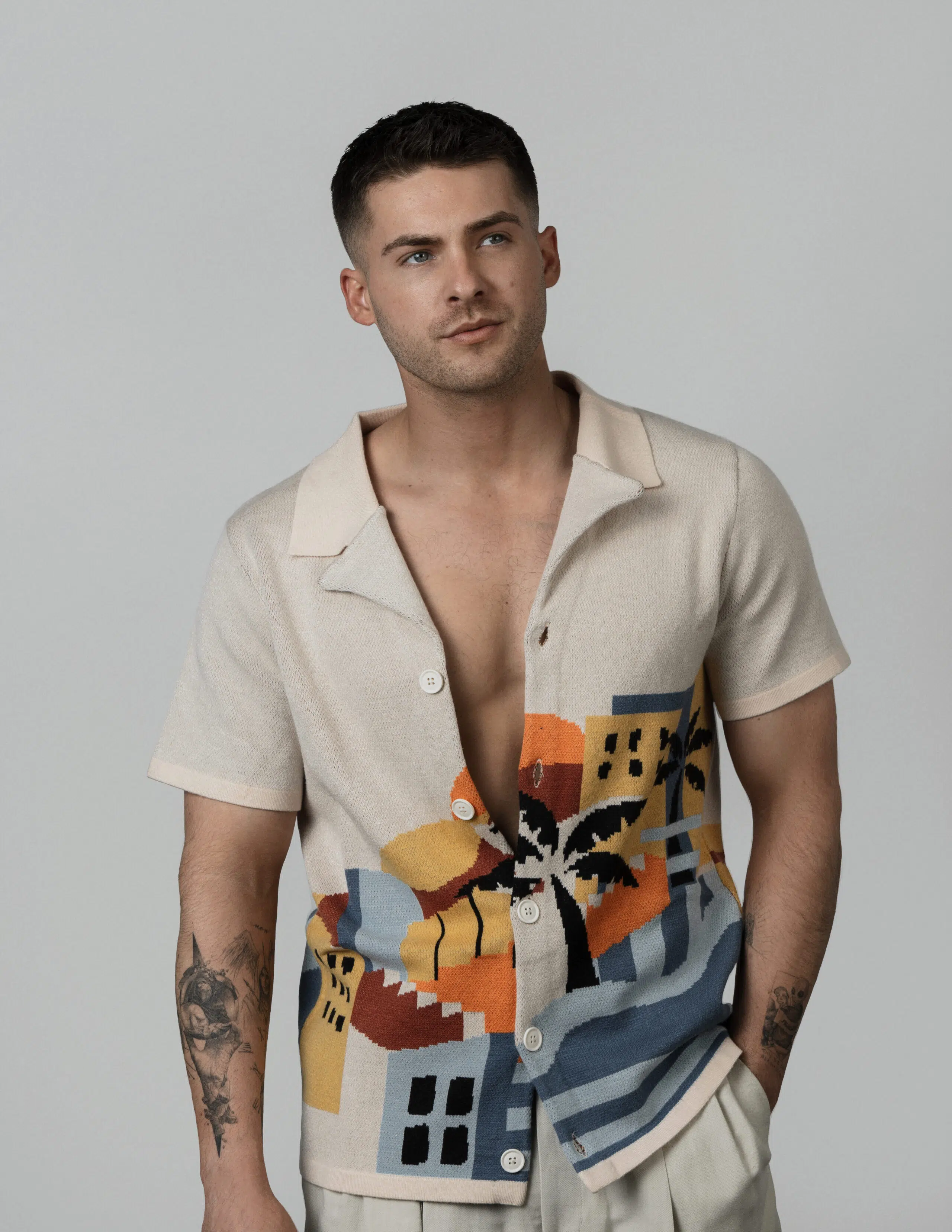
Top MAVRANS, pants ALL SAINTS, shoes COLE HAAN.
Throughout his career, Christian has played an instrumental part in projects that have engaged millions of viewers. He’s even been immortalized as the voice of Final Fantasy ’s playable protagonist Cloud Strife in a series of reinvented video games based on their original 1997 counterpart. When he initially booked the gig, Christian confesses he was concerned about the competency of his performance. After two decades of inhabiting the television screen, Final Fantasy would be his first introduction to the realm of voice acting. Stripped of an interactive set environment and the corporeality of a camera, Christian would prepare to deliver lines in a much different atmosphere, locking himself inside a dark room and pulling a hoodie over his head to get into the zone.
“We have to hear you and we have to feel you and we have to believe that you are cemented in the most exaggerated circumstances, fighting a 30 foot lizard or a house that’s come alive. The circumstances were quite ridiculous. It was a challenge. It was something new. During my first couple recording sessions, I remember thinking, ‘I don’t know if I can do this.’ That’s something that I’ve learned to really appreciate — taking on a project that makes me initially think, ‘fuck, I don’t know if I’m capable of achieving this.’ There’s really a thrill in there. There’s an opportunity to test yourself and let go and free fall into it.”
Now that he’s worked on three Final Fantasy games — without being fired or replaced, to his relief — Christian has enjoyed exploring the versatility of animation. An avid gamer himself, Christian shares his interest in playing Cloud in the inevitable live-action adaptation, pledging to grow his hair out and sling the trademark Buster Sword. “Final Fantasy really opened up the door for me and showed me different possibilities and formats of storytelling.”
But there is something else Christian has wanted to try after years of establishing himself in television. “I’ve always been a fan of film, and I’ve always wanted to exist in that format,” he says. “I’m very grateful to have had the journey of Pretty Little Liars and Teen Wolf and now All American. I’ve done a lot of episodes [and] a lot of stuff. It’s definitely prepared me and taught me a lot, but as far as performances go, I really find myself wanting to exist in the world of film, where I can really take my time and immerse myself in these moments — to have fun and discover and not be so regulated in the format of television. At the end of the day, with TV, it’s a different way of presenting art. At the end of the day, everything that’s being created has to be tied to some sort of profit. This is a business as an industry. As I’m getting older, I find myself gravitating towards films.”
In 2017, Christian took the first step toward fulfilling that ambition by starring in his first feature film. As the titular character in the biopic Notorious Nick, Christian helped share the true story of one-armed MMA fighter Nick Newell on the road to the Xtreme Fighting Championship. “It was everything that I could have asked for. It was such an amazing character. The storyline was super dope, and I got to dive into it. I really got to exist and connect all of these different parts of the film. It was raw, it was gritty, it was intense. We did a lot of shit that would never fly in a studio setting — some guerilla filmmaking. It felt so honest, and it felt so real. There haven’t been a lot of projects that have left me feeling that fulfilled. I know with confidence that that environment is something that I’m looking to exist [in].”
Christian rapidly lists off the roles that interest him, warning that there will never be enough time to elaborate on his compulsion to each — a homeless man, a superhero, a supervillain, a soldier fighting on the frontlines of a war (“I think that’s a very powerful, very human story to tell,” he adds). “I’ve been in this industry my whole life. There’s pros and cons to that, but one pro is that I look at life through a very cinematic lens. I see the beauty and the intensity and the drama and the mundane. I see a story that someone else would glaze over and pass by. I’m constantly looking for ways to connect with the world emotionally through riveted storytelling.”
While he hopes to produce and develop projects in the future, proactively bringing stories to life behind the scenes, acting will always be his one true calling. As he approaches 30 next year, Christian intends to keep acting for as long as humanly and physically possible.
“I’m most grateful for finding something that I love so deeply at such a young age. It’s given me a lot of time to be in this world — to learn it, to appreciate it, to love it, to grow with it,” Christian says. “I’m hoping I have a lot of time ahead of me. I’m in a place where, unlike an athlete or some other conventional jobs, as long as I’m feeling up for it — as long as my heart and soul are there — I get to keep doing this. I’m excited to be in this until I’m old. I’m strapped up for a lifetime with this.”
Photography IRENE CHEN
Fashion NORA FOLEY and ANNIE EASTON
Grooming KELLY CHRISTENSEN
Words KATELYN POTHAKUL
Cover Design JUNG YOUN KIM
Layout JUNG YOUN KIM
Copy CALEB STINE AND SAMANTHA MARQUEZ
Retouch KATERYNA STINICH
Special thanks to THE BRAND PARTNERS
You may also like
Michael Evans Behling on amplifying unheard voices
Actor Michael Evans Behling may have become America’s high school heartthrob overnight, but the jo

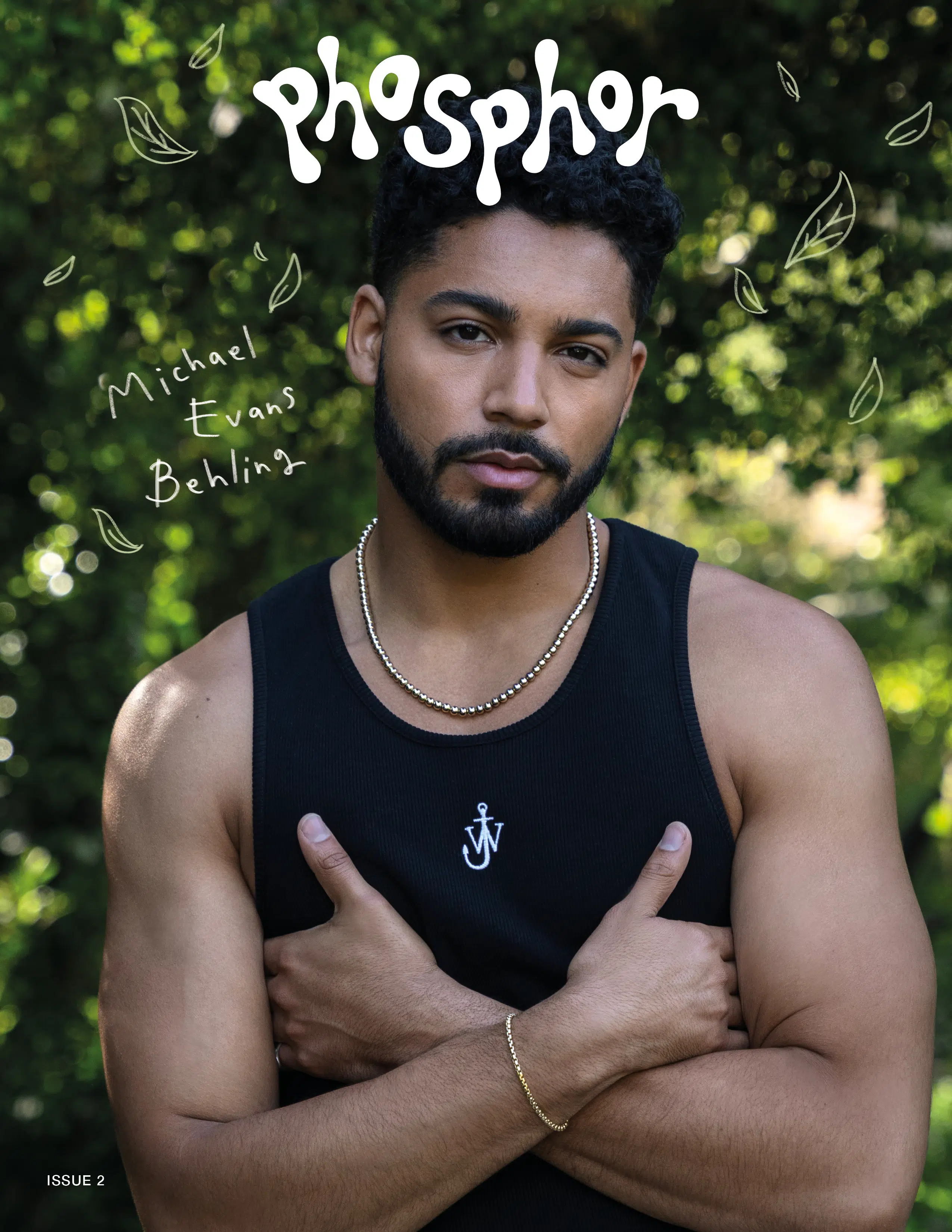



Post a comment